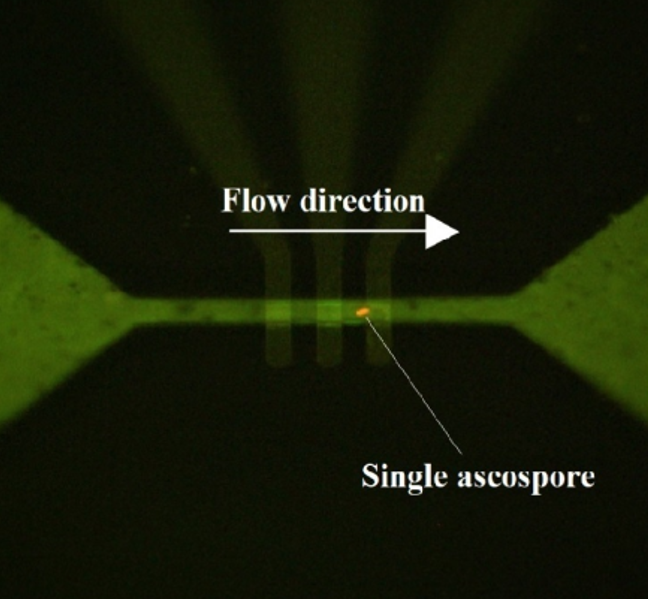Using a ‘lab-on-a-chip’ in the fight against COVID-19
Powerhouse researchers at the University of Alberta have joined forces to develop a handheld Lab-on-a-Chip (LOC) device for rapidly detecting COVID-19 antibodies. LOC technology involves the miniaturization and integration of components (e.g., sensors, a pump, a centrifuge, a microchip, etc.) into small, portable devices that can carry out laboratory tests whenever and wherever needed. Alberta researchers are at the forefront of advancing LOC technology and applying it to the detection of different diseases. Read More
“Ultrasound-assisted Magnetic Nanoparticle-based Gene Delivery” was accepted by PLOS ONE
Targeted gene delivery is important in biomedical research and applications. In this paper, we synergistically combine non-viral chemical materials, magnetic nanoparticles (MNPs), and a physical technique, low-intensity pulsed ultrasound (LIPUS), to achieve efficiently and targeted gene delivery. Read More
“Safety Assessment of a Wearable Low-Intensity Pulsed Ultrasound Device for Relieving Mental Illness Symptoms” was accepted by IEEE Xplore
Depression is expected to be one of the significant global medical burdens. Ultrasound therapy, with much-encouraging evidence, has been demonstrated to have a beneficial effect on alleviating mental illness symptoms (neuropsychiatric conditions). However, the study of estimating the risk of using transcranial therapeutic ultrasound has barely been investigated. Read More
Dr. Ray Liu elected as IEEE President
Dr. Jie Chen's Ph.D. supervisor, Dr. Ray Liu, was elected as IEEE president.
“I am simply one of YOU. I started as a student member over 35 years ago. I read IEEE journals, I attend IEEE Conferences, I use IEEE Standards, I participate in IEEE webinars, and I enjoy attending local Chapter events. I have also volunteered time to make IEEE a better place for all of us, starting with IEEE’s Signal Processing Society and moving up to overseeing all of IEEE’s Societies and Councils as Vice President, Technical Activities, and being a member of IEEE’s Board of Directors. I understand the issues you are facing in your professional lives, whether getting started after graduation, excelling/struggling in academia or industry, or prospering in the “Gig economy” as an entrepreneur. I am running to represent YOU to make IEEE more relevant and useful for all of us!” - Ray Liu
“Overcoming the sensitivity vs. throughput tradeoff in Coulter counters: a novel side counter design” was accepted by Biosensors and Bioelectronics
Microfabricated Coulter counters are attractive for point of care (POC) applications since they are label free and compact. However, these approaches inherently suffer from a trade off between sample throughput and sensitivity. The counter measures a change in impedance due to displaced fluid volume by passing cells, and thus the counter’s signal increases with the fraction of the sensing volume displaced. Read More
“Impact of low-intensity pulsed ultrasound on transcription and metabolite compositions in proliferation and functionalization of human adipose-derived mesenchymal stromal cell” was accepted by Scientific Reports
To investigate the effect of low-intensity pulsed ultrasound (LIPUS) on the proliferation of human adipose-derived mesenchymal stromal cells (hASCs) and uncovered its stimulation mechanism. LIPUS at 30 W/cm2 was applied for 5 min/day to promote the proliferation of hASCs. Flow cytometry was used to study the cell surface markers, cell cycle, and apoptosis of hASCs. Read More
Putting Alberta on the front lines fighting COVID-19
Seven Alberta-based researchers are receiving funding for innovative technology projects that will help fight COVID-19. The seven projects – which will research topics like antibody detection and the real-life experiences of patients and caregivers – will split $2.1 million in funding from Alberta Innovates. A panel of provincial partners, including experts from Alberta Innovates, Alberta Health and Alberta Health Services, chose these projects based on their potential to improve Albertans’ safety against COVID-19. Five of the chosen projects will be at the University of Alberta and two will be at the University of Calgary. Read More
“Single Ascospore Detection for the Forecasting of Sclerotinia Stem Rot of Canola” was accepted by Lab-on-a-Chip
Smart-agriculture technologies comprise a set of management systems designed to sustainably increase the efficiency and productivity of farming. In this paper, we present a lab-on-a-chip device that can be employed as a plant disease forecasting tool for canola crops. Read More
“Secondary Metabolites Profiled in Cannabis Inflorescences, Leaves, Stem Barks, and Roots for Medicinal Purposes” was accepted by Scientific Reports
Cannabis research has historically focused on the most prevalent cannabinoids. However, extracts with a broad spectrum of secondary metabolites may have increased efficacy and decreased adverse effects compared to cannabinoids in isolation. Cannabis’s complexity contributes to the length and breadth of its historical usage, including the individual application of the leaves, stem barks, and roots, for which modern research has not fully developed its therapeutic potential. Read More








